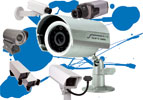

The key consideration for ensuring CCTV system reliability is ‘installation’. This is the view of John Loftus, managing director of Norbain SA, the continent’s leading distributor of CCTV and access control equipment.
"Everyone wants their CCTV security and surveillance system to be reliable," says Loftus. "However, you can spend as much as you like purchasing state-of-the-art equipment - if the system is not tailored to meet your specific needs and you have not ensured that your installer is well-qualified and meticulous, the equipment will fail, not through any fault of its own but because it is either being utilised in a manner or environment it was never designed for, or the installation is shoddy and haphazard.
"We always have to remember that the pieces of equipment we deal with are highly sensitive and intricate pieces of electronic wizardry. As such, they need to be treated with respect in order to perform well once they are installed, not man-handled out of their boxes, left lying in the sun and dirt while we take our lunch breaks, and not squeezed into unsuitable housings.
"If you want the best out of your investment in CCTV, make sure your installation team is well-trained, professional, neat and meticulous. If it is, chances are your system will perform well and reliably; if not, there is a high likelihood the equipment will fail and it will spend more time in the repair facility than on your premises doing what it was bought to do," he says.
In addition to ensuring its consultants and technicians are able to provide first rate support to its customers, Norbain follows several other guidelines when selecting CCTV equipment to ensure its reliability and functionality.
Firstly, when it comes to camera reliability, Norbain says it is important to use the right technology for the right application. Here, Norbain's system designers consider:
* Environmental conditions (indoor, outdoor, hot, cold, wet, corrosive coastal areas etc.)
* Lighting conditions (natural light, artificial light (fluorescent, halogen or sodium, night time surveillance).
* Power source and stability of that power.
* Whether or not the camera's IP rating is suitable for the application.
* Temperature ranges under which the camera must operate.
Secondly, when selecting the camera, they have to consider the exact application for which it being bought. Is it for general surveillance (in which case elect for a medium resolution camera in an overt or covert placing) or identification of people or objects (which means you will need high-resolution and is generally an overt placing).
Then, one needs to evaluate the distance of the object from the camera in order to select the correct lens. For example, longer distances generally require standard high-res overt cameras.
Other questions that should be asked include:
* Will this be a fixed or remote controlled system?
* Are aesthetics important, such as in architecturally designed foyers, buildings and business parks?
* Will it be used day and night; in which case, do you need scene illumination, backlit compensation or wide dynamic range requirements?
* What enclosure will best suit the application - industrial, commercial or domestic?
"Some of the problems that arise when the correct equipment is used include poor picture quality, incorrect product for application, underperforming recording system and poor playback information resolution.
"As a result, the original reason for investing in a CCTV system still exists, the customer becomes dissatisfied, loses faith in CCTV technology as a security solution and starts looking at different technology to find a solution to their security problems.
"Given all these factors, Norbain has compiled a list to guide you when next you want to purchase a camera for a specific application. Only when you are certain these questions have been confidently answered, will you be assured you are making the right choice," says Loftus.
What to ask for when selecting a CCTV camera:
* Does the camera resolution match the application?
* Is the camera suitable for the required conditions?
* Does the camera's minimum illumination specification match the scene conditions during all of the required operational hours?
* Can the camera function in the environment's temperature range?
* Does the camera's physical size match mounting positions?
* What are the camera's power requirements -12 V d.c., 24 V a.c. or 220 V a.c. and will they suit the installation?
* Is it a recognised product supplied by a recognised supplier?
* What does the camera warranty cover?
* Where is the local service support and repair centre?
For more information contact John Loftus, Norbain SA, +27 (0)11 887 1546, [email protected]
| Tel: | +27 87 802 2288 |
| Email: | [email protected] |
| www: | www.reditron.co.za |
| Articles: | More information and articles about Reditron |
© Technews Publishing (Pty) Ltd. | All Rights Reserved.